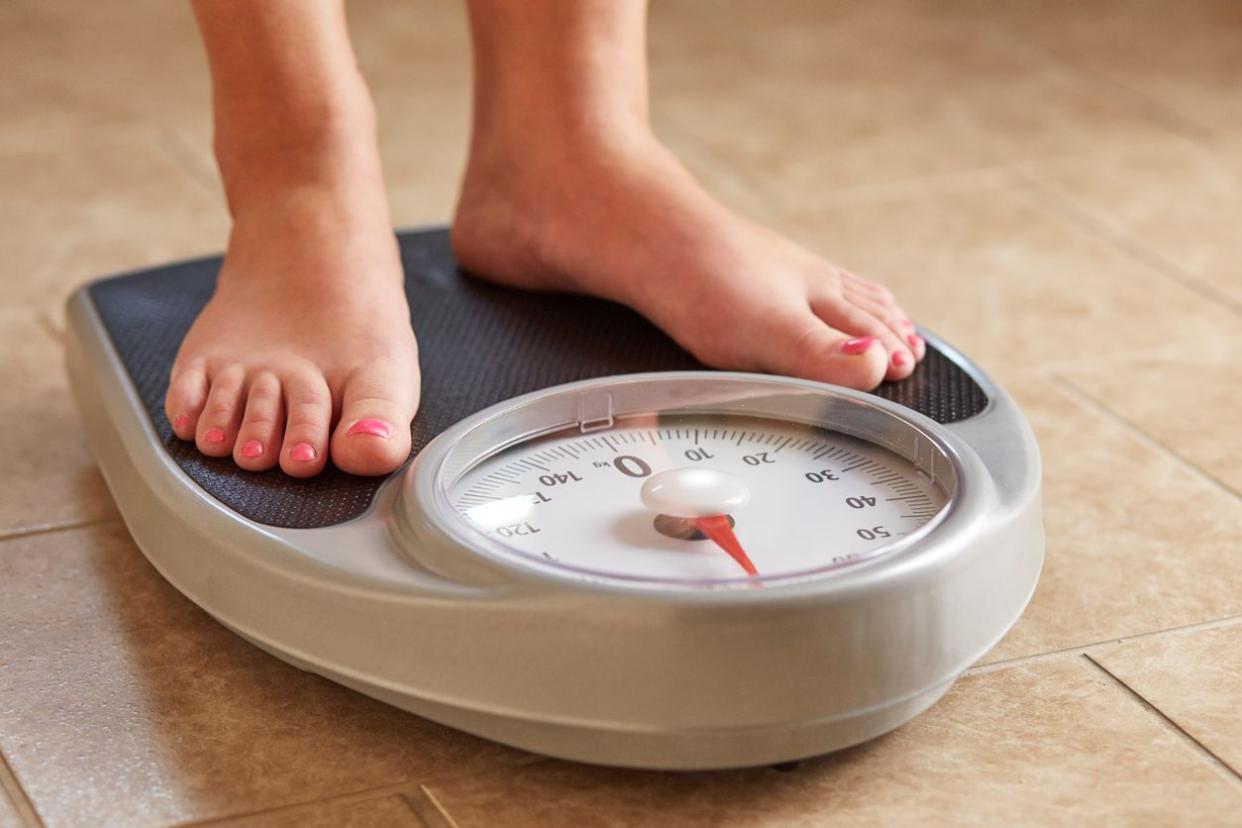14 Reasons You're Not Losing Weight, According to Experts

14 Reasons You're Not Losing Weight, According to Experts
Maybe you’ve been on your weight loss journey for a few months but haven’t noticed the numbers on the scale going down. Maybe they’re even going up, leading you to wonder, Why am I not losing weight?
Weight loss might seem straightforward enough — eat balanced meals and move more. However, several factors contribute to weight loss, many of which can also hinder weight loss efforts.
From what you eat to how you move to medications and more, we’ll explain why you’re not losing weight and what to do about slow weight loss.

Why Am I Not Losing Weight?
If you’re struggling to lose weight, you should know that a weight loss journey can be influenced by internal and external factors.
Not only is your weight loss journey personal, but several things can affect the process, like sleep habits, what you eat and your exercise routine.
So, why is it hard to lose weight? You can think of weight management as a stool — each part is a leg that supports it.
For example, if you’ve been prescribed weight loss medication to help reduce body weight but have stopped losing weight, you might want to look at the other parts of your weight loss plan.
Balanced meals filled with a variety of nutrients, regular physical activity, quality sleep, smart beverage choices and stress management are just a few of the legs supporting the metaphorical weight loss stool.
If you’re asking yourself, Why am I not losing weight?, one (or more) of the reasons below could be the answer.

14 Reasons You’re Not Losing Weight
Even if you’re doing everything “right” to hit your weight loss goals, you might not be seeing the desired results. Here are some possible reasons why you’re not losing weight:
You’ve hit a weight loss plateau
You’re overeating
You’re not eating whole foods
You’re not getting enough protein
You’re eating too much sugar
You haven’t switched to whole-grain carbs
You’re not moving enough
You’re not getting enough sleep
You’re not drinking enough water
You’re not being mindful of alcohol
You’re eating too many small meals
You have a condition that affects your weight
There’s too much stress in your life
Weight loss is a slow, non-linear process
Read on for details.
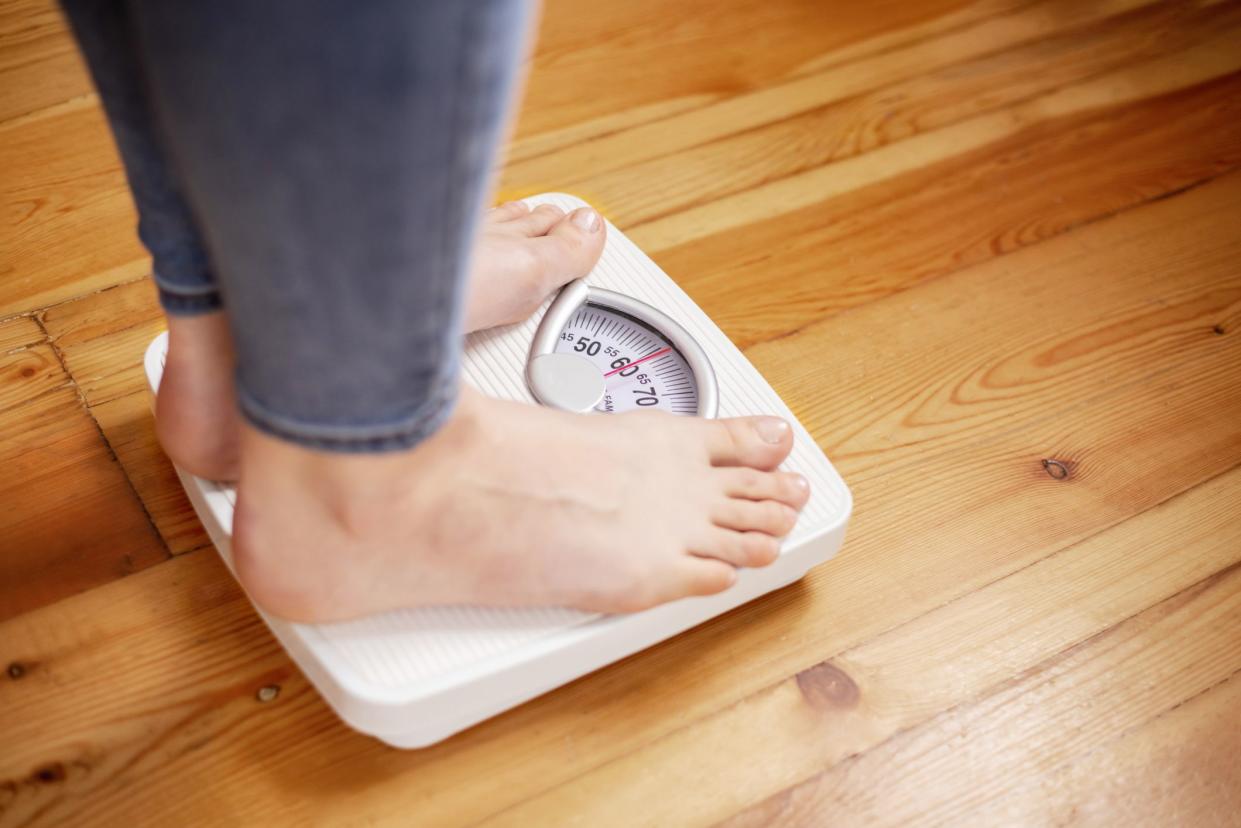
1. You’ve Hit a Weight Loss Plateau
Maybe your weight loss started quickly with just a few changes to what you ate or how often you exercised.
But weight loss sometimes slows down or stops altogether after a while for a few possible reasons:
Your body adapts to weight loss and adjusts against further weight loss.
Your calorie intake adjusts to your new body weight.
Your metabolism slows down if you lose weight quickly.
Or it may only seem like you’re struggling to lose weight simply because you’re gaining muscle while losing fat — especially if you’ve started working out while bumping up your protein intake.
The scale isn’t the only way to track your health progress, as it doesn’t track how much body fat you could be losing.
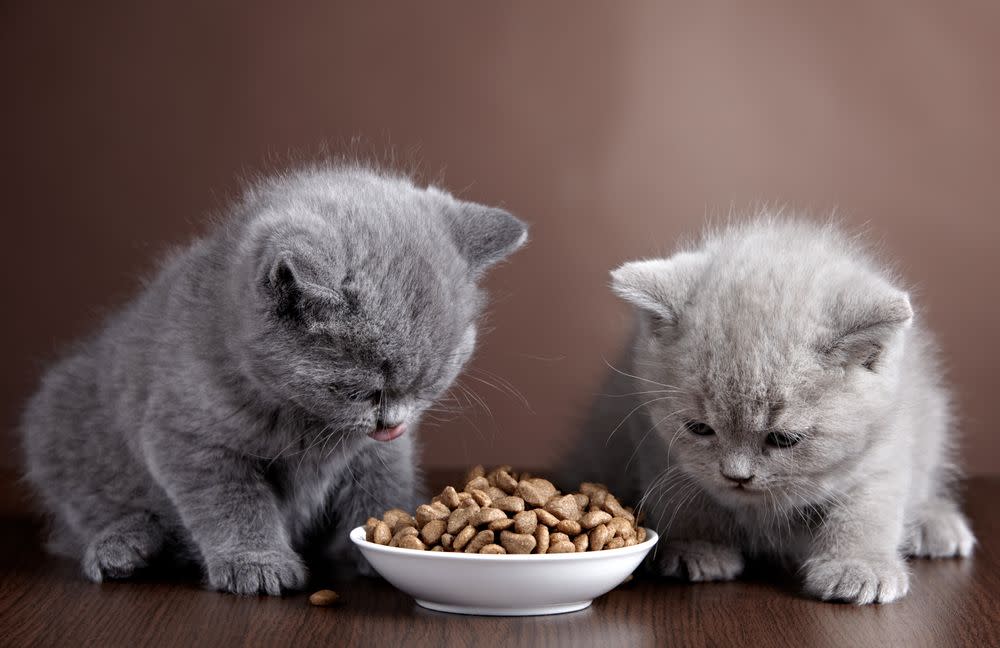
2. You’re Overeating
One common recommendation for a weight loss plan is portion control.
But overeating can happen, even when trying to lose weight. Reducing your calorie intake could increase the hormones responsible for stimulating your appetite, especially if you become more active.
Research suggests that jotting down what you eat in a food journal may help with weight loss. One issue with food tracking, though, is its potential to lead to eating disorders, particularly for those previously diagnosed.
You could also try mindful eating — being present during meals and putting screens away. A small study showed that prolonged chewing and mindfulness when eating led to decreases in body mass index (BMI).

3. You’re Not Eating Whole Foods
Do you find yourself thinking, Why do I gain weight when I eat less?. You may not be eating the right types of foods. What you eat is just as important as how much you eat.
If you’re eating less but gaining weight or just not losing weight, you could be eating too many processed foods. This can lead to a higher risk of health conditions like obesity, as well as increased blood pressure, heart disease and blood sugar levels.
Try including more whole foods like fruits, vegetables, whole grains (which we’ll talk about more below), lean protein and healthy fats in your meal plan.
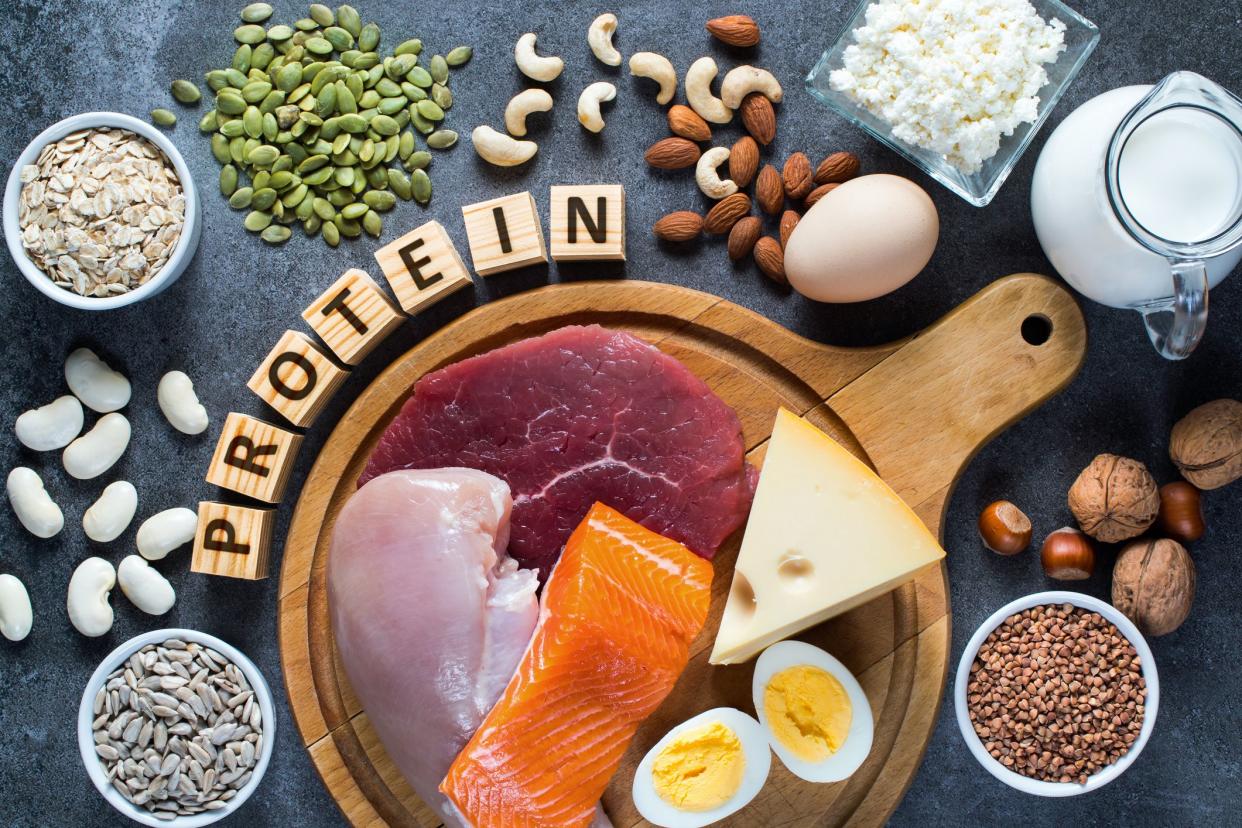
4. You’re Not Getting Enough Protein
Maybe you’ve started a new weight loss plan that includes more whole foods and regular exercise. But you’re still left wondering, Why am I gaining weight when I’m eating less and working out?!
One possible reason why you’re working out but not losing weight is that you’re not getting enough protein.
A vital macronutrient in a healthy diet (along with healthy fats and carbohydrates), protein is necessary for losing weight. A high-protein diet can help you feel fuller longer and may prevent obesity-related health conditions like type 2 diabetes and heart disease.
In general, eating enough protein to lose weight means getting roughly 30 percent of your daily calories from protein — although some healthcare professionals advocate for more.
Try adding some high-protein snacks for weight loss, like hard-boiled eggs or Greek yogurt.

5. You’re Eating Too Much Sugar
There’s plenty of evidence that consuming too much sugar can lead to excess weight or obesity. So cutting out sugary foods seems like a logical step in your weight loss efforts.
But sugar can still sneak its way into your diet if you drink soda, juices or even beverages marketed as “healthy” but contain high amounts of sucrose or fructose (other names for sugar).
These sugary drinks can have the same effect on your brain as sugary food by making you think you’re full and eating less of other foods.
Try increasing your water intake or even adding sliced fruit or cucumbers to your water for more flavor.
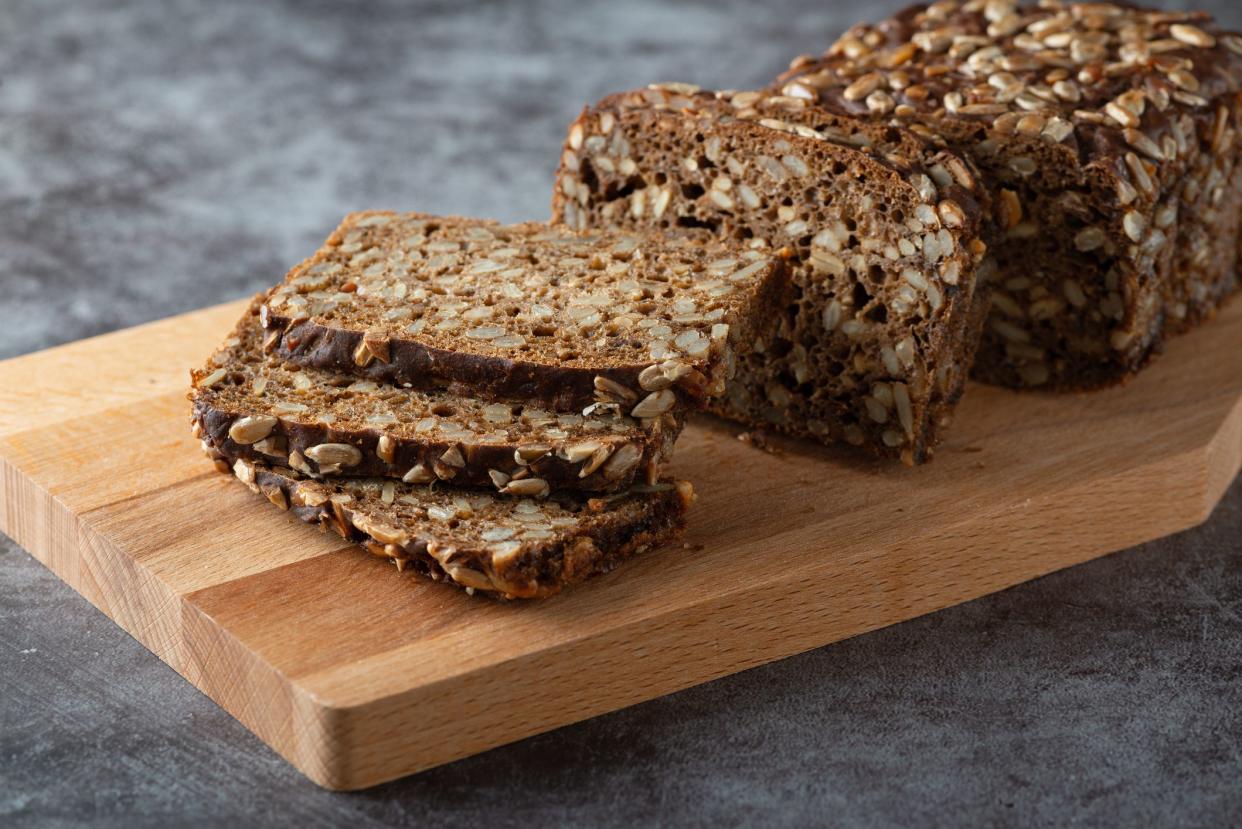
6. You Haven’t Switched to Whole-Grain Carbs
In weight loss history, carbs have cycled in and out of what’s deemed healthy eating. More often than not, they’re seen as a villain.
But as it turns out, cutting out carbs completely can lead to fatigue, constipation and irritability.
Another reason why you’re not losing weight could be that you haven’t switched to whole-grain carbohydrates, which provide necessary vitamins, minerals and fiber.
Whole-grain carbs may also help weight loss and prevent weight gain compared to refined grains.
Instead of banishing carbs entirely, choose whole grains like whole-wheat bread, rye, barley and quinoa for optimal nutrition.

7. You’re Not Moving Enough
Maybe you’re eating enough protein or have added more whole foods to your diet. Or maybe you’re trying intermittent fasting (only eating during a specified timeframe) but still getting enough nutrients.
But if you’re not losing weight on intermittent fasting, you could be missing regular movement and exercise (yes, these are two different things).
Starting an exercise routine with both cardio and strength training can help with weight loss.
Another component of weight loss is regular movement. NEAT (non-exercise activity thermogenesis) is all the calories you burn not working out, sleeping or eating — things like walking, standing or even fidgeting.
Moving more — getting more steps in, sitting less and taking short walks, for example — could help with weight loss, in addition to an exercise routine and other healthy habits.

8. You’re Not Getting Enough Sleep
Why did I stop losing weight? you might ask. You’re not getting enough sleep or good-quality rest.
A lack of sleep, sleeping at irregular times, sleep disorders and poor sleep quality can all disrupt your mental and physical health — including increasing weight gain.
People with sleep deprivation, or those who sleep less than the recommended amount of seven to nine hours a night, are more likely to have excess weight or obesity.
Since sleep affects weight loss, aim for at least seven hours by going to bed and waking up at regular times, keeping your bedroom dark and quiet and limiting screen time before hitting the sack.

9. You’re Not Drinking Enough Water
When you’re struggling to lose weight, make sure you’re drinking enough water.
Not only should you be drinking water to stay hydrated, but excessive water consumption plays a role in losing weight and body fat while suppressing appetite.
Drinking more water may also help weight loss by boosting your metabolism — how your body energy from food.

10. You’re Not Being Mindful of Alcohol
Not only can not drinking enough water lead to slow weight loss, but not watching how much alcohol you consume can also hinder your weight loss efforts.
A 2016 study of people with excess weight or obesity found that since alcohol lowers inhibitions, it can lead to overeating. Participants who limited drinking were more likely to lose weight.
Moderate alcohol consumption for women is no more than one glass a day.

11. You’re Eating Too Many Small Meals
When trying to lose weight, you may have switched to smaller meals.
But if you’re not losing weight, it could mean you’re still eating too much. How often you eat has little to no effect on body weight.
Though some people follow a meal plan with several small meals or snacks a day thinking they’re eating less, it could still amount to more overall.

12. You Have a Health Condition That Affects Your Weight
Another reason that might have you frantically wondering, Why is it hard to lose weight? is health conditions.
Some medical conditions like hypothyroidism (lack of thyroid hormones) or polycystic ovary syndrome (PCOS) can have side effects like weight gain.
Mental health conditions like depression may also lead to weight gain or certain medications, such as antidepressants.

13. There’s Too Much Stress in Your Life
Ever find yourself stressing out about your weight loss journey, asking yourself, Why can’t I lose weight when I exercise and eat right?
That stress (and other daily stressors) can affect your weight. Experiencing stress for long periods can slow down your weight loss, as too many stress hormones like cortisol can lead to weight gain.
Stress can affect the hormones that manage appetite and hunger levels, leading to overeating and craving more foods high in fat or sugar.
Stress eating might make you feel better at the moment, but healthy long-term solutions to handle stress, like meditation or mindfulness, will have the same effects.

14. Weight Loss Is a Slow, Non-Linear Process
The truth about weight loss is that it’s not a straight process. Even if you lost weight quickly at the beginning, you might hit an unexpected plateau or slow down with weight loss — which is totally normal.
Realistically, fast weight loss probably won’t continue after the first few weeks. Understanding why you hit a plateau or why you’re not losing weight can help you get back on track.
Weight loss plateaus can sometimes be broken with simple adjustments to your diet or other lifestyle habits. Some folks may need support from weight loss drugs like metformin or Ozempic.
What are the benefits of metformin and other medications for weight loss? They can help reduce body weight in those who may be struggling or have type 2 diabetes. Whether it’s Ozempic or metformin, these drugs often help in addition to a healthy diet and exercise.

Key Takeaways of Why You’re Not Losing Weight
Everyone’s weight loss journey is different. But many people hit plateaus, which leads them to wonder, Why can’t I lose weight? or Why am I not losing weight?
Here’s what to keep in mind if you’re not losing weight despite your best efforts:
Reducing body weight depends on nutrition, sleep and regular activity. It can also be influenced by other factors like health conditions, medication and stress, to name a few.
Not losing weight could be because of overeating. Or it could be that you’re not eating enough whole foods or drinking enough water while limiting sugary beverages and alcohol.
You could also struggle to lose weight due to lack of exercise, not getting enough quality sleep, high-stress levels, underlying medical conditions or side effects from medications.
Weight loss consists of several different parts, from what you eat to how you move, your mental well-being and more. Addressing all components (lifestyle factors, nutrition, physical activity levels and underlying health conditions) is crucial for achieving and sustaining successful weight loss.
This article originally appeared on Forhers.com and was syndicated by MediaFeed.org.
